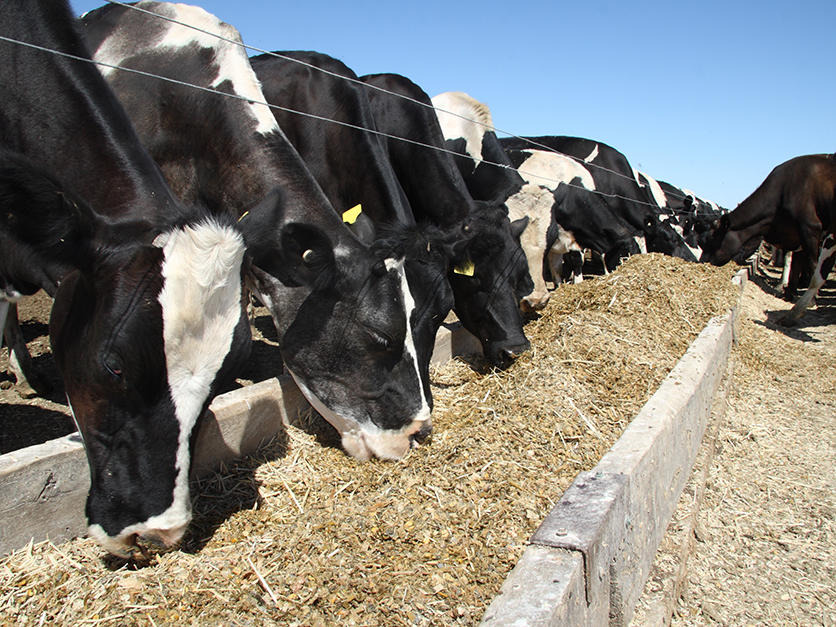Democrats on a key Senate committee raised concerns Wednesday about a proposal backed by major farm groups to permanently bar the Environmental Protection Agency from regulating greenhouse gas emissions in the livestock industry.
Republicans on the Senate Environment and Public Works Committee rallied around the bill, introduced in April by Sens. John Thune, R-S.D., and Kyrsten Sinema, D-Ariz. Sen. Joni Ernst, R-Iowa, sat beside a "No Cow Tax" poster and touted the bill as a way to reduce the burdens that future regulations could place on small farmers and ranchers.
“Our hardworking farmers and ranchers really shouldn’t have to worry about overly onerous regulations coming from the federal government,” she said.
The bill would make permanent a restriction that Congress has included in EPA's annual appropriations bills since 2009.
Sen. Ed Markey, D-Mass., said he was concerned that removing one industry from Clean Air Act regulations would incentivize the oil and gas industry to ask for similar exemptions. He said voluntary initiatives for reducing emissions don’t work, pushing back against American Farm Bureau Federation Vice President Scott VanderWal's call for a voluntary approach to reducing agricultural emissions.
“We have 50 years of experience in this country to know that voluntary measures don't cut greenhouse gases enough to avoid a climate crisis,” Markey said. “We need to take that seriously with actual real measures.”
Two other senators — Arizona Democrat Mark Kelly and Arkansas Republican John Boozman, who serves as the ranking member of the Senate Ag Committee — have signed on as co-sponsors of the bill. Thune and Senate Majority Leader Chuck Schumer, D-N.Y., helped slide the measure in annual appropriations legislation in 2009, where it has remained each year since.
Thune, testifying before the committee, said the bill would stop potential regulations that he worries could lead to higher food costs for consumers.
“Passing this legislation would provide livestock producers long-term certainty that their livelihoods will not be compromised by regulatory overreach,” Thune said.
The EPA does not currently issue require permits for livestock emissions, a point emphasized by committee Chairman Tom Carper, D-Del. Using appropriations bills to restrict EPA's regulatory authority gives Congress the “flexibility” to decide whether or not to exempt livestock emissions each year, said Carper.
“The decision on whether this restriction is necessary is up to Congress each year—not the EPA,” Carper said.
But VanderWal, who also serves as the president of the South Dakota Farm Bureau, said the bill would prevent producers from having to comply with what he deems “onerous regulations.” If the EPA were to impose Clean Air Act requirements on producers, he said that would increase production costs and hurt some farm operations.
“It would be far better to have this in statute, by Congress, that would say the EPA does not regulate agriculture based on greenhouse gas emissions,” VanderWal said. “It would provide certainty for us going forward and people could really concentrate on innovation and technology, and be able to work on those things rather than worrying about what the government might do in the next year.”
John Walke, clean air director for the Natural Resources Defense Council, warned the panel that the bill would exempt an industry he believes should be scrutinized for its contribution to carbon emissions from the Clean Air Act.
“If we kick the can down the road with an appropriation rider, we can always change our mind,” Walke said. “But if it becomes a permanent exemption from the Clean Air Act, my experience is, it’s just never going to go away.”
The bill also is supported by Ducks Unlimited, the National Cattleman’s Beef Association, the U.S. Cattlemen’s Association, the American Sheep Industry Association, the National Bison Association and Edge Dairy Farmer Cooperative.
For more news, go to www.agri-pulse.com.
Correction: This article previously attributed Sen. Ed Markey's concerns about the Livestock Regulatory Protection Act to Sen. Alex Padilla. It was Markey who raised those concerns in the hearing, not Padilla.



